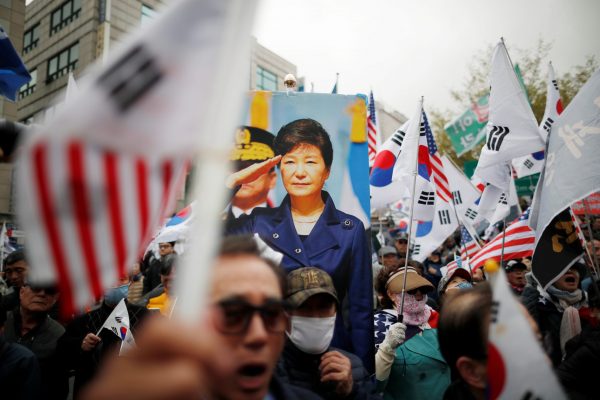The prosecution pressed 18 criminal charges against her, including bribery and abuse of power. A court sentenced Park’s confidante, Choi Soon-sil, to 20 years in jail on similar charges in February 2018. To discourage political corruption, the court sentenced Park heavily, even if the prosecution’s original request for a 30-year jail sentence seemed too harsh in the eyes of some.
The verdict marks the return of liberalism in South Korean politics and the decline of conservatism. A previous political scandal revolving around former president Lee Myung-bak, Park’s predecessor from the same political party, casts a further shadow over conservative politicians. Like Park, a prosecutor charged Lee for bribery and abuse of power. Most conservative politicians are concerned about a complete defeat in the June 2018 local elections for 17 municipal and provincial leaders. It may take conservative politicians a long time to regain support from voters.
Diplomacy and economic policies have changed substantially under the current liberal government. Contrary to Park and Lee’s hard-line approach to North Korea, Moon has emphasised the importance of dialogue. Despite some criticism, Moon allowed senior officials from North Korea, including Kim Jong-un’s sister, to attend the Pyeongchang Olympics. The subsequent visit of envoys from Seoul to Pyongyang, who met with Kim Jong-un himself, led to remarkable diplomatic pledges to resolve tensions arising from the North’s development of the nuclear weapons.
The inter-Korea summit scheduled to take place on 27 April 2018 in the demilitarised zone is a crucial stepping stone towards resolving the nuclear tensions. The summit also catalysed the beginning of open dialogue between North Korea and the United States. US President Donald Trump accepted an invitation from Kim for a separate summit between the United States and North Korea when South Korean envoys visited the White House earlier this year to report on the inter-Korean summit preparations. It would be a diplomatic marvel if this summit occurs as planned in May 2018.
The sharing of power between liberals and conservatives is beneficial for the maturation of South Korea’s democracy. The long dominance of conservative governance in South Korea ended when Nobel Peace Prize winner Kim Dae-jung became president in 1998 and was succeeded by another liberal politician, Roh Moo-hyun. During these two presidents’ respective rules, South Koreans began to re-evaluate the importance of dialogue with North Korea, of individual well-being and equity, and of the meaning of the nation to the individual. These values balance traditional conservative values such as the importance of the market system, freedom, free trade and strong political ties with the United States.
But the Moon administration’s emphasis on resolving equity issues has arguably stifled entrepreneurship and restricted economic growth. Over the last year, the government introduced many experimental economic policies under the notion of economic democratisation. Moon increased public sector employment by 12,000 positions, fulfilling his election commitment of being a ‘job president’. The new positions require a budget of 10 trillion won (US$8.8 billion). On top of this, the government increased the corporate tax rate for companies whose taxable revenue exceeds 300 billion won (US$282 million) to 25 per cent from 22 per cent. These policies go against global trends.
Rapid increases in the minimum wage and restrictions on work hours have also put pressure on business activities, particularly for small and medium enterprises (SMEs). The government increased the minimum wage by 16 per cent in January 2018, which exceeds expectations of a 5 per cent increase. This may accelerate SMEs’ exodus to foreign countries — a concerning outcome given that the total market capitalisation of SMEs leaving the country has already increased from US$2.7 billion in 2010 to US$7.5 billion in 2017 according to the Export-Import Bank of Korea’s database.
Though increasing the minimum wage is required to promote equity, some economists are concerned that radical increases within short periods will instead hurt unskilled workers. While the strengthened political power of labour unions was one of the major factors behind the ‘Candlelight Revolution’ to impeach Park, unions have also created additional costs for multinational enterprises in South Korea. Incidentally, General Motors announced the closure of its Kunsan plant in February 2018.
The absence of political corruption, as part of an equitable and democratic society, is important for everyone — including business people. Unfortunately, the outcome of the Park case has gone beyond inhibiting political corruption to inhibiting conservatism more generally — and that has damaged South Korea’s formerly business-friendly environment.
Byung-seong Min is a Senior Lecturer in the Department of International Business and Asian Studies, Griffith University.

